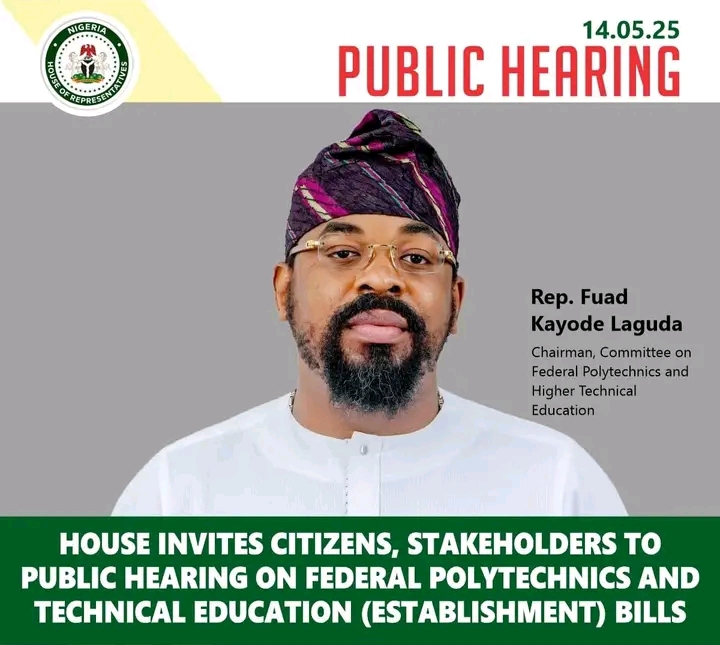Reps Open Legislative Gates: Stakeholders Invited to Shape Future of Polytechnic, Technical Education
In a determined stride toward revitalising Nigeria’s technical and vocational education landscape, the House of Representatives has summoned the nation’s educational stakeholders, civil society actors, and the general public to a decisive public hearing on three pivotal bills aimed at transforming federal polytechnics and technical education across the country.
The public hearing—set to hold on Thursday, May 15, 2025, at 11:00 a.m., in Conference Room 231 of the National Assembly Complex, Abuja—will be conducted by the House Committee on Federal Polytechnics and Higher Technical Education.
Speaking ahead of the event, Chairman of the Committee, Rep. Fuad Kayode Laguda, underscored the significance of the initiative, declaring, “This hearing is not just procedural—it is a vital step in aligning our polytechnic system with Nigeria’s present and future economic realities. We are building a law that speaks to skills, innovation, and national development.”
The legislative push focuses on three transformative bills:
- HB.1797 – A Bill seeking to establish the Federal College of Entrepreneurship and Skills Acquisition in Hawul Local Government Area of Borno State. The institution will offer comprehensive, full-time training in technology, applied sciences, humanities, and management with an emphasis on entrepreneurship and skill-based education.
- HB.1413 – A proposed amendment to Section 3(2)(b) and Section 31 of the Federal Polytechnics Act, aiming to modernise existing legal frameworks to reflect current academic and administrative realities.
- HB.2114 – A Bill to revise the core functions of federal polytechnics, ensuring that their mandates are better tailored to Nigeria’s pressing need for a technically adept workforce.
According to Rep. Akin Rotimi Jr., Spokesman of the House, the hearing epitomises the 10th Assembly’s dedication to “inclusive, responsive, and reform-minded lawmaking.” He called on all relevant voices—academics, professional associations, student unions, technocrats, and media—to “seize this opportunity to influence a generation-defining policy shift.”
This hearing, he emphasized, is a critical conduit through which the people can actively shape education policies that directly impact innovation, productivity, and national growth.
The House has urged widespread participation, asserting that the outcome of this engagement will form the bedrock for enduring reforms in Nigeria’s polytechnic and technical education sector—an area long overdue for legislative attention and strategic investment.
“The future of Nigeria’s economy hinges on the calibre of its workforce. Technical education must no longer be an afterthought—it must be a national priority,” Laguda added.
All eyes now turn to the hallowed chambers of the National Assembly as the country prepares for what could be a turning point in the legislative journey toward a stronger, skill-driven educational system.

